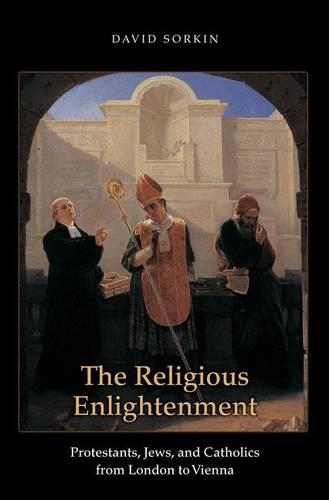
The Religious Enlightenment: Protestants, Jews, and Catholics from London to Vienna
(Paperback)
Publishing Details
The Religious Enlightenment: Protestants, Jews, and Catholics from London to Vienna
By (Author) Professor David Sorkin
Princeton University Press
Princeton University Press
25th July 2011
United States
Classifications
Tertiary Education
Non Fiction
Religious issues and debates
History of religion
Philosophical traditions and schools of thought
274.07
Physical Properties
Paperback
360
Width 152mm, Height 235mm
482g
Description
In intellectual and political culture, the Enlightenment is routinely celebrated as the starting point of modernity and secular rationalism, or demonized as the source of a godless liberalism in conflict with religious faith. This book intends to alter our understanding by showing that the Enlightenment, at its heart, was religious in nature.
Reviews
"Why can't religion and the Enlightenment be friends What's that, you say They were friends Why didn't anyone tell us Well, David Sorkin has. A professor of history and Jewish studies at the University of Wisconsin, he argues in a new study that religion and the Enlightenment were even more than friends... The French Revolution and its Napoleonic aftermath not only destroyed the religious Enlightenment in practice; it also created, as Dr. Sorkin notes, a 'religious-secular dichotomy' that condemned this side of the Enlightenment to historical obscurity. Rescuing it from that obscurity, he insists, is of much more than academic interest."--Peter Steinfels, New York Times "This is a book about religious ideas of the 18th century. Although scholars tend to see the Enlightenment as antireligious and secular, Sorkin persuasively argues that this was not the whole story. Instead, all of Europe's major religions produced movements of religious reform compatible with the Enlightenment... [S]orkin makes his case that there were individuals and groups within organized religion who welcomed the Enlightenment and tried to accommodate religion within it."--P. Grendler, Choice "Sorkin makes very interesting discoveries about the parallel developments within different religions in the eighteenth century."--Larry Wolff, American Historical Review "Sorkin has written a powerful, imaginative, and path-breaking study that fundamentally challenges reigning academic conceptions of the Enlightenment, the birth of modern Europe, and the path of modern European history... The author's argument for a more moderate view of the birth and path of modernity across the European continent--one that grew out of dialogue and toleration and not out of religious or ethnic conflict--is compelling and persuasive."--Scott Ury, Religious Studies Review "This dense, erudite and necessary book certainly establishes that religious reform was a central--and precarious--feature of the Enlightenment. It ... should effect a decisive shift in our understanding of that period."--Ritchie Robertson, German History "Sorkin's study presents a valuable contribution to the ongoing reassessment of the Enlightenment... The beautifully written essays display an uncommon fairness to each faith and are supported by an admirable historical erudition."--Louis Dupre, Catholic Historical Review "Theologians and historians will both find this book useful."--Erna Oliver, Studia Historiae Ecclesisticae "[O]ne hopes that this concise, erudite, and unprepossessing book succeeds in putting its moderate subjects where they should be: in the middle of our eighteenth-century map."--Suzanne Marchand, Cambridge Journals "[N]ot the least among this book's achievements is the revival of discussion on the religious Enlightenment in the multiconfessional and multinational Austrian monarchy."--Grete Klingenstein, Austrian History Yearbook "In brief, this is a deeply researched, well-written, and compelling account of the importance of religion in shaping European enlightenments."--James E. Bradley, Church History
Author Bio
David Sorkin is the Frances and Laurence Weinstein Professor of Jewish Studies and professor of history at the University of Wisconsin-Madison. His books include "The Berlin Haskalah and German Religious Thought" and "Moses Mendelssohn and the Religious Enlightenment".
